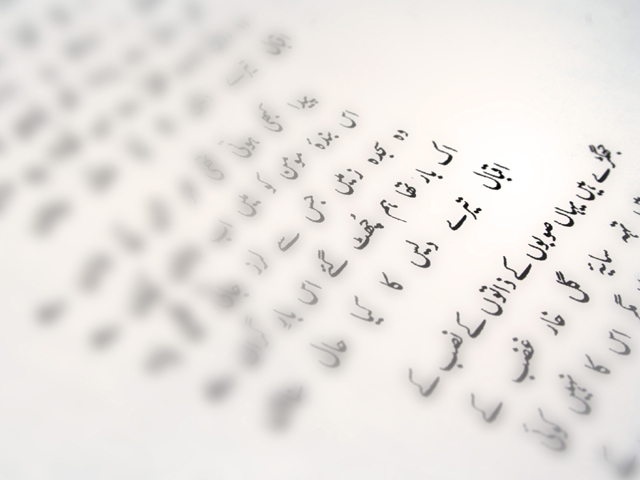
Scholar Arfa Sayeda Zehra noted, in her own witty style, that social distortion of language leads to social chaos. The session on 'Urdu ka sitam ya Urdu pe sitam' [Injustice by Urdu or Injustice to Urdu], moderated by poet Fatema Hassan on the third day of the fourth Karachi Literature Festival, centred on the use and misuse of Urdu as a language.
"One politician comes up with the 'glad tidings' of tsunami while another associates 'good news' with his drone attack," said Zehra. She asked the audience whether the zuban [language] or the khayal [notion] is at fault in, what she termed, the "glad tidings of destruction". She explained that both the language and the notion are borrowed as the words from other languages stick to their original connotations. However, the politicians misuse them in Urdu rhetoric.
Urdu is treated the way we, as a nation, have dealt with the political sphere of our lives. A myriad of meaningless slogans and power devoid of command defines our politics, as well as, our treatment of Urdu.
When she was choosing the title of the session, Zehra stuck to the literal meanings of the word 'sitam' as it was used in Urdu prose and poetry. "Both the excessive emotional attachment and altogether negligence perpetuate a 'sitam'," she noted. "And this has been the case with Urdu for long."
Clearly unhappy with a ringing cellphone in the audience, Zehra said, "If nothing has changed in the last 66 years, believe me no significant change will happen in the next half hour."
The sensitivity that elevates a language to the status of faith does injustice with the very language. "We happen to elevate things to the limit, the crossing of which amounts to blasphemy."
The other extreme, is the complete lack of ownership for the language which fails to appreciate Urdu as well as the heritage attached to it. "A certain section never tried to instil a close affinity with Urdu in them," she said.
For both the excesses, either we attempt to exercise authority over Urdu, the way we do with women without giving an attempt to understand them, or we abandon it altogether.
For Pakistanis wanting to see Urdu as a self-dependent language, Zehra suggested we emerge as a self-dependent nation first. Culturally subdued nations cannot help incur influences and even then they remain inspired with awe. "If anybody speaks English or a word of it in the accent of our own, we take no qualms in terming them 'Urdu-medium'," she said. "Ironically, many among them are those who do not even know how to read Urdu."
To Zehra, languages are the cultural reflection of nations as these are the medium to reflect their sophistication and priorities. Every living language goes, however, through a process of change and expands by adopting words from different languages. "Those languages that resist to change also resist to live on and die out eventually."
COMMENTS (4)
Comments are moderated and generally will be posted if they are on-topic and not abusive.
For more information, please see our Comments FAQ

1722586547-0/Untitled-design-(73)1722586547-0-165x106.webp)


1732326457-0/prime-(1)1732326457-0-165x106.webp)












The premise of Urdu as some great symbol of nationalism is flawed from the outset. English should have remained the sole official language of the subcontinent. This isn't to say that we don't respect our culture or our roots but you must understand that Urdu is nobody's mother tongue, my mother tongue is Pashto, just as a Punjabi's is Punjabi and a Balochi's is Balochi and a Sindhi's is Sindhi and indeed in terms of the former East Pakistan a Bengali's is Bengali.
What one sees is the historic transposition of Urdu (which is nothing more than a dialect of Hindi), upon the masses, children who grow up speaking one language are taught in two separate languages (Urdu and English) as if learning one foreign language isn't hard enough for the lower classes who have to educate themselves in downtrodden, useless government cesspit schools.
As to why this transposition took place, it just so happened that it was the tongue of the ruling political class (of British India) who took power when the British left. At this point some may try to argue that Urdu flourished before the Raj, but this simply isn't true because prior to the Raj - Persian was Pakistan's lingua franca.
Urdu is ultimately a close cognate of Punjabi and so it serves the Punjabi majority who are increasingly inept when it comes to English, to maintain a language that is easy for them to speak.
Of course we "Ethnics" to use a ham-handed collective term, have inhabited these lands and spoken our tongues for thousands of years, all of a sudden, because of state coercion we are told to speak Urdu.
As far as English is concerned, it is the global lingua franca and it is of the utmost importance to be able to speak it if one wishes to pursue ANY intellectual pursuit. Our regional tongues (which are being killed by the predominance of not one but two foreign languages - i.e. English and Urdu) will be able to recover in such a scenario.
Although I do agree with the article's sentiment, English is so infectious and our own culture is so weak that it cannot stand up to the influx of globalization - What you hear on Pakistani TV is no longer Urdu it is Creole.
@Sterry: "Come on- Urdu is as useful as Bangla now in today’s world. Pakistan should just adopt English and develop. Urdu only makes the nation a Third world country since it restricts thought and education." . Brilliant insight. No one could have even dreamed of saying that.
Come on- Urdu is as useful as Bangla now in today's world. Pakistan should just adopt English and develop. Urdu only makes the nation a Third world country since it restricts thought and education.
Dr. Arfa Sayeda Zehra is by far the most thoughtful person in Pakistan. I urge everyone to watch her TED talk. http://youtu.be/o7fx56sT0dk